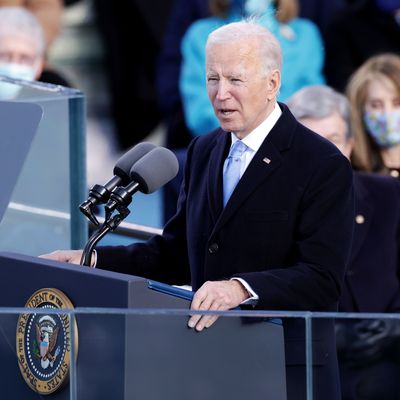
Joe Biden’s Inaugural Address was a well-wrought and well-delivered speech with multiple themes, as we might expect given the complex and dangerous situation his administration and the country will face. A call for “unity” was Biden’s much-advertised-in-advance preoccupation for much of the address, which was obligatory given the hyperpolarized atmosphere, his party’s narrow grip on power, and his predecessor’s divisive nature. The new president also dwelled appropriately on what he called the “cascading crises of our era,” particularly the COVID-19 pandemic, its economic impact, and the struggle for racial justice. And he briefly but eloquently referred to Donald Trump’s attempted election coup by saying, “We’ve learned again that democracy is precious; democracy is fragile. And at this hour, my friends, democracy has prevailed.”
Biden made one simple point, however, that may be overlooked — but may also be the key to his success:
Our history has been a constant struggle between the American ideal, that we are all created equal, and the harsh, ugly reality that racism, nativism, and fear have torn us apart. The battle is perennial and victory is never secure.
Through civil war, the Great Depression, world war, 9/11, through struggle, sacrifice, and setback, our better angels have always prevailed. In each of our moments enough of us have come together to carry all of us forward, and we can do that now.
It’s easy to treat Biden’s assertion of the central importance of equality to the American experience as banal. Don’t we all at some level, conservatives and progressives alike, believe that “we are all created equal”?
Not during the administration that just left office, or for some years before, as white racial resentment, homophobia, hatred of nonwhite immigrants and refugees, and anti-feminism gradually gained a toehold and then a stronghold in one of our two major parties. While Trump made more extreme expressions of racism acceptable for the first time in decades, he was hardly the first apostle of anti-egalitarian backlash in recent years. The tea-party movement that formed in reaction to the Obama-Biden administration was violently hostile to any sort of redistribution of resources to promote equality, and many tea-party folk blamed the housing and financial crises of 2008 and the Great Recession that quickly followed on those people who lacked the moral fiber to take care of themselves. Some began to call themselves “constitutional conservatives” on the theory that limited government and property rights, not democracy and definitely not equality, were the eternal underpinnings of the Republic, as provided for by divinely inspired Founders.
While no one would call Donald Trump a “constitutional conservative,” he conquered the GOP by weaponing white grievances and marrying them to culture-war passions. The MAGA movement accepted as axiomatic that white Christians are the primary victims of discrimination these days; that recognition of racial injustice is “political correctness”; and that intolerance toward racists and other apostles of privilege represents a “cancel culture” incompatible with liberty.
So, no, Trump’s Republican Party did not believe in equality in any significant way other than via the sterile idea that government’s refusal to help those in need represents “equal opportunity.” The retreat from equality and from democracy in the GOP was most dangerously and conspicuously reflected in a rapid retreat from support for voting rights — a bipartisan cause as recently as 2006, when George W. Bush proudly signed an extension of the Voting Rights Act of 1965 (subsequently neutered in 2013 when a conservative majority of the Supreme Court Bush helped create struck down the VRA’s chief enforcement mechanism). Hostility to voting rights combined with latent and not-so-latent racism fed the wild effort to overturn the 2020 elections that brought the Trump presidency to its ignominious end.
The unity Biden seeks will depend on Republicans repudiating this lurch into the kind of authoritarian thinking necessary to restore the “American greatness” of the white Christian patriarchal society of the 1950s. Yes, my colleague Jonathan Chait is right that if Republicans eschew Trump’s hatefully divisive rhetoric and find some practical areas of bipartisan agreement, the tone in Washington can be improved to the point where armed gangs of MAGA rebels won’t be tempted to overthrow the government in an “uncivil war that pits red against blue,” as Biden put it in his Inaugural Address. But more fundamental progress is going to require unity not just in programs and projects but in fundamental values and a sense of what the country needs to do to live up to its promise. So long as the GOP views itself as a bulwark for denying equality on behalf of those who fear the loss of privilege, the “uncivil war” will never be more than a crisis away from resurgence.
It’s unclear how well Biden himself understands the inextricable connection between equality and unity at this perilous point in history. But this passage in his address alluding to Abraham Lincoln’s example was a good sign:
In another January on New Year’s Day in 1863 Abraham Lincoln signed the Emancipation Proclamation. When he put pen to paper the president said, and I quote, “If my name ever goes down in history, it’ll be for this act, and my whole soul is in it.”
My whole soul is in it today, on this January day.
Lincoln clearly believed that postwar acceptance of the abolition of the country’s greatest offense against the creed that “all men are created equal” was the precondition for reconciliation and unity. Biden should be equally explicit about the kind of commitments needed today to restore peace in our political life. Standing down from civil war isn’t enough of a requirement from those who cheered and enabled Trump for years. A renewed commitment to the great American aspiration of ever-increasing equality should be the minimum price of admission to the “new normal” governance of the Biden administration. Then real unity and progress become possible.






























